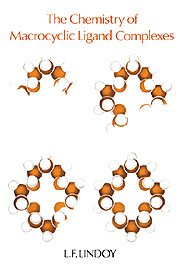Book contents
- Frontmatter
- Contents
- Preface
- 1 What is different about macrocyclic ligand complexes?
- 2 Synthetic procedures
- 3 Macrocyclic systems – some further categories
- 4 The metal-ion chemistry of polyether and related macrocyclic systems
- 5 Host-guest chemistry: macrocyclic hosts and non-metallic guests
- 6 Thermodynamic considerations
- 7 Kinetic and mechanistic considerations
- 8 Redox properties
- 9 The natural macrocycles
- References
- Index
2 - Synthetic procedures
Published online by Cambridge University Press: 08 October 2009
- Frontmatter
- Contents
- Preface
- 1 What is different about macrocyclic ligand complexes?
- 2 Synthetic procedures
- 3 Macrocyclic systems – some further categories
- 4 The metal-ion chemistry of polyether and related macrocyclic systems
- 5 Host-guest chemistry: macrocyclic hosts and non-metallic guests
- 6 Thermodynamic considerations
- 7 Kinetic and mechanistic considerations
- 8 Redox properties
- 9 The natural macrocycles
- References
- Index
Summary
Two major synthetic categories
The procedures for synthesizing macrocyclic ligand compounds are many and varied. However, the published cyclizations can be broadly subdivided into two major categories. The first of these are the ‘direct’ syntheses in which the cyclization proceeds by a conventional organic reaction and does not depend on the directing influence of a metal ion. In the second group of reactions the generation of the cyclic product is influenced by the presence of a metal ion – the metal ion acts as a ‘template’ for the cyclization reaction. There are a great many template syntheses of macrocyclic products now documented and such in situ procedures have proved to be of major synthetic significance over the years. Nevertheless, many macrocyclic systems are formed by multistep procedures and hence may involve a composite of both template and non-template reactions; it may be difficult to define the precise role(s) of the metal ion in such cases. Template effects have been studied in some depth for a few specific systems; however, research directed towards obtaining a more general understanding of such effects has been quite sparse.
A normal priority in both direct and template procedures is to maximize yields of the required product by choosing strategies which inhibit competing linear polymerization and other reactions. Unless special circumstances obtain, polymeric materials are often the major product when macrocyclic syntheses are attempted in the absence of appropriate conditions.
- Type
- Chapter
- Information
- The Chemistry of Macrocyclic Ligand Complexes , pp. 21 - 50Publisher: Cambridge University PressPrint publication year: 1989
- 2
- Cited by

